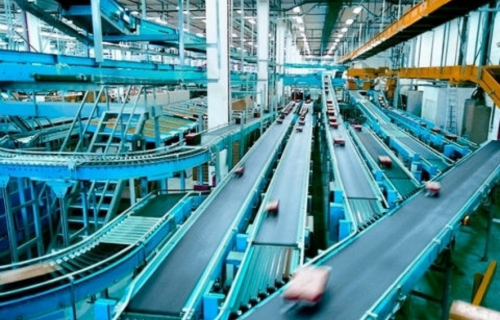Conveyor systems play a vital role in the production environment across various industries. Efficiency and reliability are crucial for minimizing operational costs. However, it is equally important to consider the environmental impact of these systems. Implementing sustainable conveyor solutions not only helps companies meet their climate goals but also ensures long-term cost savings through a lower Total Cost of Ownership (TCO).
Taking a holistic approach to developing sustainable conveyor solutions is key. It involves assessing the efficiency and performance of the entire conveyor system, going beyond just the conveyor belt itself. Factors such as resistance, resilience, and lubrication are crucial in making sustainable choices for materials and components.
Reducing Friction and Resistance
Achieving sustainability in conveyor systems often revolves around maximizing the lifespan of conveyor belts and components. Minimizing wear and tear is essential for prolonging service life. One effective approach is carefully selecting materials for the conveyor belt, such as polyurethane or PVC. These materials reduce resistance during the production process, enabling the use of lightweight electric motors. By reducing resistance, wear, and tear are minimized, resulting in a longer service life.
Another way to reduce resistance is by addressing friction. In supermarkets, for example, friction between the metal plate and conveyor belt can be reduced by applying a thin layer of plastic, typically polyurethane, to the underside of the material. Recent advancements in this plastic have significantly enhanced its friction-reducing properties. Implementing such solutions has led to substantial energy consumption reductions, as seen in a cardboard manufacturer’s case where energy consumption was reduced by over two-thirds.
Sustainable Lubrication
Traditionally, lubrication was used extensively throughout conveyor systems, leading to excessive soapy water waste. Today, there are materials available that eliminate the need for lubrication entirely. From a sustainability perspective, these dry or semi-dry conveyor solutions contribute significantly to reducing harmful environmental damage. Additionally, they create a safer working environment by keeping the floor dry and non-slippery. In industries like beverages, where the outdated method of lubrication was prevalent, adopting these solutions promotes a more sustainable production environment.
Material Resilience
Material resilience is crucial for sustainability, particularly in the food industry where conveyor belts require regular cleaning to ensure food safety. The material must not only be compatible with the components it interacts with but also resistant to the cleaning chemicals. By selecting resilient materials, wear and tear can be minimized, leading to increased service life and sustainability.
Efficient and Sustainable Production
In addition to using sustainable materials, an efficient production process is vital for achieving sustainability. Key components include reducing energy consumption, utilizing lightweight motors, and minimizing scheduled maintenance. These elements are interconnected, meaning improvements in one area will impact other components within the system.
Reducing Energy Consumption
Outdated conveyor systems tend to be inefficient and consume excessive energy. Replacing them with modern, energy-efficient systems, even before the end of their service life, is advisable. New systems are lighter and require less energy during the production process. Optimal matching of components in the drive train by a single supplier leads to substantial reductions in energy consumption and operational costs.
Using Lightweight Electric Motors
Even if a conveyor system is not due for replacement, there are still opportunities for sustainability improvements. Replacing heavy electric motors with lighter, energy-efficient alternatives can have a significant impact. Testing often reveals that lighter electric motors are sufficient to ensure smooth system operation. If the current motors’ quality is insufficient or other factors like materials and lubrication need improvement, a replacement can be justified, leading to targeted energy consumption reduction.
Reduced Maintenance
Optimizing a conveyor system to require less scheduled maintenance significantly contributes to sustainability efforts by reducing downtime. The benefits extend in both directions. On one hand, there are cost savings associated with reduced engineering and cleaning staff requirements for maintenance. On the other hand, more production can be carried out during previously scheduled maintenance times. Even minor adjustments, such as reducing maintenance time from 30 to 20 minutes, can have a substantial impact, particularly when multiple conveyor belts are involved.
Profitable and Responsible Production
Many manufacturers hesitate to replace their conveyor systems prematurely due to the initial investment involved. The decision is often based on comparing the initial investment amount to the daily operational costs for maintenance and cleaning. However, it’s important to recognize that a modern, energy-efficient installation can pay for itself within a relatively short period, such as 6 to 12 months. Choosing this economically advantageous and sustainable solution is a responsible decision.
Investment Leading to a Lower Total Cost of Ownership (TCO)
Investing in a new conveyor system or implementing sustainable solutions to improve the performance of your existing system has a significant impact on reducing the Total Cost of Ownership (TCO). Lower energy consumption directly translates to reduced operating costs. A more efficient production process results in less maintenance, decreased downtime, and increased production capacity. Furthermore, utilizing higher-quality materials minimizes wear and tear, ultimately extending the average service life of the system. In this context, the initial investment represents only a fraction of the overall TCO.
Emission Reductions
Enhancing the sustainability of your conveyor system also plays a crucial role in achieving climate goals and reducing your carbon footprint. The choice of materials, such as certain types of plastic, significantly influences emissions. For instance, biodegradable conveyor belts, while having a shorter lifespan, can be disposed of after use and naturally degrade, leading to substantial emissions reduction. These solutions are particularly relevant for logistics companies that need to report their emissions and adhere to stringent targets, despite the higher cost compared to traditional options.
EKA Conveyor Solutions
At EKA Conveyors, we provide comprehensive Conveyor Solutions tailored to meet your specific needs. Our offerings go beyond delivering custom conveyor systems. We also provide support for installation, management, and maintenance, along with valuable cleaning advice. Our aim is to offer a total package of efficient and sustainable solutions for customers across various industries. Our conveyor solutions specifically focus on:
Improved Conveyor Performance: We prioritize extending the service life of conveyor systems and reducing planned and unplanned downtime by implementing measures that minimize maintenance requirements.
Reduced Energy Consumption: Our energy-efficient systems are designed to optimize energy usage, resulting in lower energy costs. We also emphasize the collection and analysis of energy output data to enhance efficiency further.
Total Conveyor Solution: We excel in optimizing the drive train by ensuring seamless integration of all components and minimizing energy consumption throughout the system.
Compliance with Food Safety Standards: We develop conveyor systems that adhere to food safety regulations, ensuring the highest standards of product integrity and safety.
If you would like to learn more about our Conveyor Solutions and how we can assist in making your production process more sustainable, please don’t hesitate to contact one of our specialists. We are committed to providing innovative and eco-friendly conveyor solutions tailored to your unique requirements.
At EKA Conveyors, we understand the importance of reducing the environmental impact of conveyor systems. Our expertise lies in providing sustainable conveyor solutions that prioritize efficiency, longevity, and environmental responsibility. By partnering with us, you can optimize your operations while contributing to a greener future. Contact EKA Conveyors today to learn more about how our sustainable conveyor solutions can benefit your business and help you achieve your sustainability goals. Together, let’s embrace a future of efficient and environmentally friendly conveyor systems.


